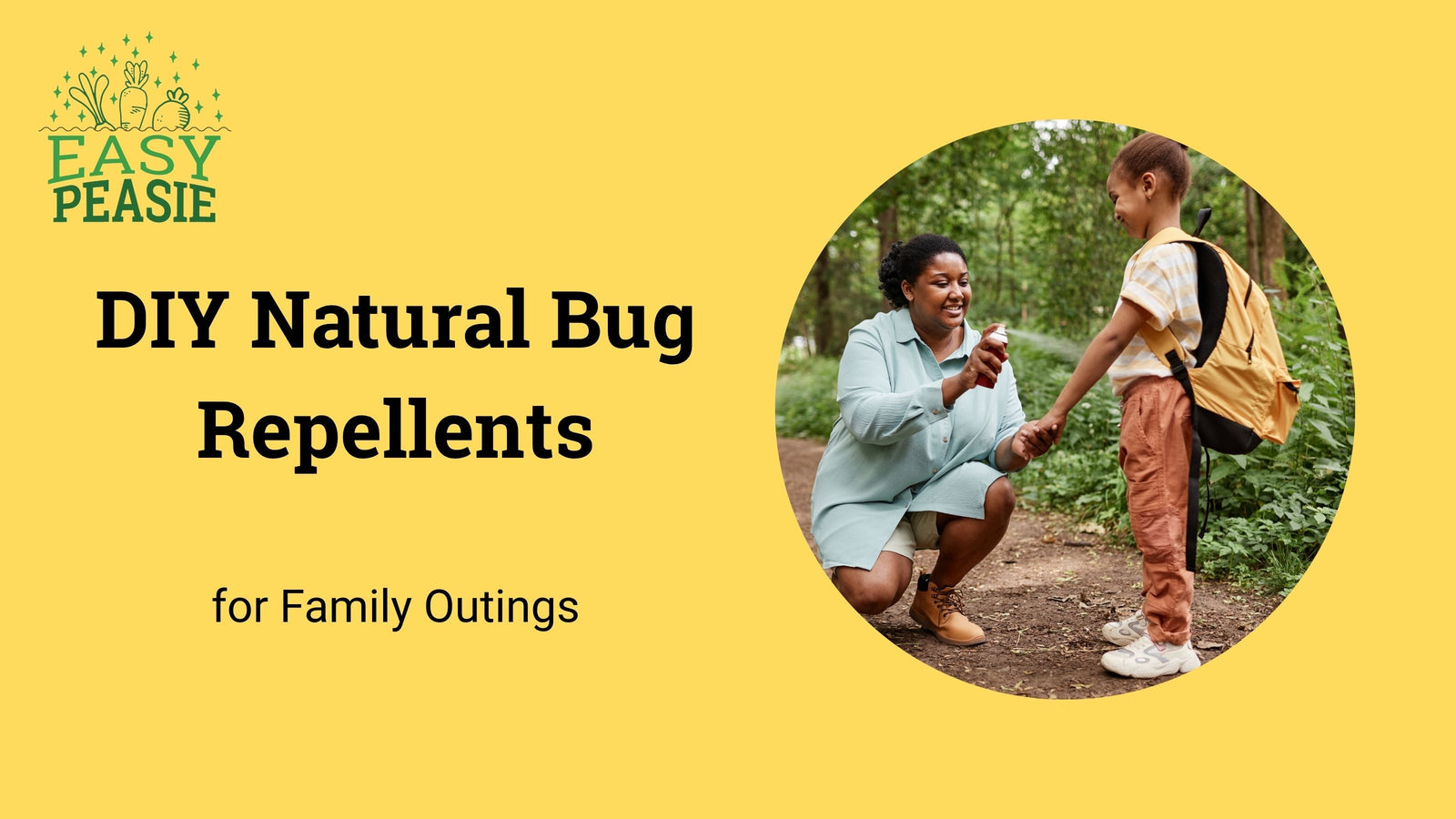Embrace Nature Safely with Natural Bug Repellents
The Importance of Bug Repellents
When embarking on outdoor adventures, from serene picnics in the park to exciting camping trips, the presence of insects can often go unnoticed until unpleasant bites appear.
Using bug repellents can maintain comfort but also to safeguard health.
These products play a vital role in repelling pesky insects that can disrupt a fun day out and pose health risks.
Mosquitoes and ticks, for example, are not just nuisances; they are carriers of serious diseases such as Lyme disease, West Nile virus, and Zika virus. The application of bug repellents becomes a first line of defense, helping to prevent these insects from making close contact and reducing the likelihood of bites. Moreover, some bugs, like sand flies and fleas, cause severe itching and discomfort, potentially leading to secondary skin infections from scratching.
In addition to these health benefits, using bug repellent enhances the overall outdoor experience. Families can enjoy their activities without the constant bother of swatting away flies or applying after-bite creams, making their time outdoors more pleasant and memorable. Therefore, integrating bug repellent into your outdoor routine is an essential step in preparing for any outdoor activity, ensuring that everyone can remain focused on enjoying the beauty of nature and the joy of togetherness.
Choosing Natural Over Chemical
While there are numerous chemical repellents available that promise effective protection, natural bug repellents offer a safer, eco-friendly alternative. Using natural ingredients reduces exposure to synthetic chemicals that can be harsh on the skin, especially for children.
Natural repellents leverage the power of plants and essential oils, which have been used for centuries to ward off insects. Not only do these natural solutions provide effective protection, but they also often come with pleasant scents and moisturizing properties that benefit the skin.
In this blog, we'll explore how you can create your own natural bug repellents that are both safe and effective, ensuring that your family can enjoy every outdoor adventure worry-free.
Understanding Natural Bug Repellents
What is Natural Bug Repellent?
Natural bug repellent consists of products or substances derived from natural sources, such as plants, that are used to deter insects. These repellents often contain essential oils and other plant extracts known to repel bugs effectively.
The key benefits of using natural ingredients include fewer side effects, such as skin irritation or respiratory issues, which are sometimes associated with synthetic chemicals. Additionally, natural repellents are environmentally friendly and safer for use around children and pets.
Effectiveness of Natural Ingredients
When it comes to the effectiveness of natural versus chemical repellents, natural ingredients have shown considerable promise in keeping various pests at bay. Ingredients like citronella, eucalyptus, and peppermint oil are not only potent but also provide a sustainable alternative without the environmental impact of DEET and other chemicals.
Although some natural ingredients may need to be applied more frequently than their chemical counterparts, their safety profile and pleasant aromas make them a preferred choice for many families seeking a healthier lifestyle and effective insect protection.
By understanding what natural bug repellents are and how their effectiveness measures up to chemical options, families can make informed decisions that align with their health and environmental values while enjoying their time outdoors without the nuisance of insect bites.
Essential Oils as Bug Repellents
Best Essential Oils for Bug Repellent
Essential oils offer a delightful blend of aromatherapeutic benefits and natural insect-repelling properties, making them a popular choice for those looking to fend off pests naturally.
Citronella oil is renowned for its mosquito-repelling capabilities, often serving as the primary ingredient in many natural repellents. Lemon eucalyptus oil, noted for its effectiveness comparable to DEET, provides a robust defense against mosquitoes.
Additionally, lavender oil, appreciated not only for its calming scent but also for its ability to deter mosquitoes, ticks, and moths, adds both efficacy and a soothing aroma to any repellent blend.
These essential oils are not only effective in keeping pests away but are also gentle on the skin, making them suitable for frequent application during outdoor activities.
They provide a refreshing scent that enhances the outdoor experience without the harshness of chemical repellents.
DIY Recipes with Essential Oils
Creating your own bug repellent with essential oils is a simple and rewarding DIY project.
By combining citronella, lavender, and lemon eucalyptus oil with a base like witch hazel or distilled water, you can create a potent natural repellent.
This mixture can be easily prepared by adding the essential oils to a spray bottle filled with your base of choice, then shaking well to ensure the ingredients are thoroughly mixed. The resulting repellent can be sprayed liberally on exposed skin and clothing, providing a pleasant-smelling shield against pests.
This DIY solution is not only effective but also adaptable, allowing for adjustments in the concentration of essential oils based on personal preference and specific outdoor conditions. Remember to perform a patch test on a small area of skin to confirm there is no irritation, ensuring a safe and enjoyable outdoor adventure with a naturally scented, chemical-free bug repellent.
Homemade Bug Repellent Recipes
Simple Recipes for Families
Creating your own natural bug repellent is not only an effective way to keep pests at bay, but it’s also a fun activity that can involve the whole family. One popular recipe combines witch hazel and apple cider vinegar with essential oils like citronella, peppermint, and lemongrass.
This mix is known for its strong protective properties against mosquitoes and other biting insects, making it perfect for outdoor use. Simply mix the ingredients in a spray bottle and apply to exposed skin and clothing, ensuring you avoid sensitive areas such as the face and hands.
For those who prefer to avoid essential oils, a natural alternative involves using common household items like dried herbs—lavender, peppermint, or catnip—and fresh lemon juice. Boiling these herbs in water, then mixing with lemon juice after cooling, creates a gentle yet effective repellent. This herb-infused repellent is especially good for those with sensitive skin or for applying on children, as it avoids the potent concentrations found in essential oils yet still provides reliable protection against bugs.
Both methods offer natural, chemical-free options for keeping insects away, allowing your family to enjoy the outdoors without the worry of bug bites. Whether you’re gearing up for a camping trip, a picnic, or just an evening in the backyard, these DIY solutions are great for ensuring everyone stays comfortable and itch-free.
Application and Storage Tips
How to Apply Natural Bug Repellent
For natural bug repellents to be most effective, proper application is key. It's important to apply the repellent generously and evenly over all exposed skin.
Reapply every few hours, especially if you are sweating or have gone swimming, as water and perspiration can dilute the effectiveness of the repellent. For areas like the face, spray the repellent onto your hands first and then gently apply it to the face, avoiding the eyes and mouth to prevent irritation.
Storing DIY Repellents
Proper storage is crucial to maintaining the effectiveness of your DIY bug repellents.
Keep your repellent in a cool, dark place to prevent the degradation of essential oils and other active ingredients.
Glass spray bottles can help extend the life of your repellent, as plastic can sometimes react with essential oils over time. Ensure the lid is tightly sealed to prevent evaporation.
Typically, homemade repellents can be stored for up to a year if made with fresh ingredients and stored correctly.
By following these application and storage tips, you can maximize the efficacy and shelf life of your homemade natural bug repellents. This ensures that your outdoor adventures are not only fun and enjoyable but also free from unwanted pests.
Testing and Customizing
Testing Effectiveness
To ensure your homemade bug repellent is effective in your local area, it's important to test it under the conditions where you'll use it. Apply your DIY repellent before a short outdoor activity and observe its effectiveness against local bugs.
Take note of how long the repellent lasts before you need to reapply. This testing can help you determine if you need to adjust the concentration of essential oils or other active ingredients to better suit your environment.
Customizing Recipes
Once you've tested the basic repellent recipe, you might find that adjustments are needed to cater to your family’s specific needs or to better target the prevalent bugs in your area.
If mosquitoes are more of a concern, increasing the amount of citronella or lemon eucalyptus oil can enhance your repellent’s effectiveness. For those with sensitive skin, you may want to experiment with milder oils like lavender or dilute the mixture more. Encourage family members to give feedback on the scent and feel of the repellent, so you can make it as pleasant as possible to use.
By thoughtfully testing and customizing your homemade bug repellent, you can create a tailored solution that keeps your family protected while also being mindful of their skin care needs and scent preferences. This personalized approach ensures that everyone can enjoy the great outdoors without the nuisance of bug bites.
Summary: Embrace Natural Protection
Celebrate the Benefits of DIY Natural Bug Repellents
As we wrap up our exploration of DIY natural bug repellents, it's clear that these homemade solutions offer a wonderful blend of safety, effectiveness, and environmental friendliness.
By choosing natural ingredients, you reduce your family’s exposure to harsh chemicals while still effectively warding off pesky insects.
These natural repellents are not only easy to make but also allow for customization to suit individual preferences and local needs, making them a practical choice for any family.
Dive In and DIY
Try creating your own natural bug repellents. It’s a simple, satisfying way to take control of your family's outdoor protection, and you might be surprised at just how effective these natural solutions can be. Plus, making repellents at home can be a fun activity that even the kids can participate in—mixing ingredients and choosing their favorite scents.
Once you’ve tried your hand at it, share your experiences and any tips you’ve discovered along the way. Your insights could help others perfect their own recipes and enjoy more bug-free time outdoors.
By embracing the DIY approach, you not only gain an effective bug repellent but also contribute to a healthier, more sustainable way of living.
Share Your Natural Repellent Recipes and Experiences
Share Your DIY Successes
We've covered a lot about making your own natural bug repellents, and now I'd love to hear from you! Do you have a favorite recipe that works wonders for keeping the bugs at bay? Perhaps you've discovered a unique blend of essential oils that smells great and keeps mosquitoes away?
Share your recipes, tweaks, and success stories in the comments below. Your insights could inspire and help other families looking to embrace a more natural approach to bug protection.
Leave your comments below; we love to hear from you! And don't forget to follow Easy Peasie for more info and convo on YouTube, Facebook, and Instagram! ~ThePeas





